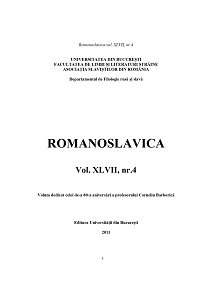Nacionálny racionalizmus Jána Chalupku
The National Rationalism of Ján Chalupka
Author(s): Marta FülöpováSubject(s): Theatre, Dance, Performing Arts, Novel, Slovak Literature, Theory of Literature, Sociology of Literature
Published by: Editura Universităţii din Bucureşti
Keywords: Jan Chalupka; image studies; literary image of Hungarians; stereotypes in literature;
Summary/Abstract: The work analyses the prosaic works of Jan Chalupka from the aspect of image studies, with emphasis put on the novel Bendeguz. It explores the literary image of Hungarians that is being created in the novel. The basis for this are the results of an international survey of national stereotypes of the University of Amsterdam that are stated in the handbook of imagology (Imagology. The cultural construction and literary representation of national characters. A critical survey. Ed. BELLER, Manfred, LEERSSEN, Joep, Amsterdam – New York: Rodopi). In the introduction it makes the simplified classification of Chalupka into explicitly Slovak literature more difficult and shifts his perception into the field of creation on the territory of Hungarian Kingdom. It analyses the main characteristics of the creation of Chalupka: influence of enlightenment and rationalism that is identified mainly in the usage of the mock principle as an instrument of recovery of problems of the society, enlightenment optimism, sensualism of the imagery. Centre of the work is the analysis of an imagology profile of Hungarians on the basis of the categories of the national identity: national currency, religion, geographical conditions, external look, psychological attributes and social themes. The emphasis is put on literary interpretation of the image: through which means the author expresses the ethnicity or nationality of a character, which influence has the national identity on other characteristics of a character, which compository role have these passages in the composition of the text. Particularity of the image of Hungarians from Chalupka is a view from inside, from the perspective of a Pseudohungarian who considers everything that is Hungarian positive. The satire is accomplished by using of hyperbolization, by far-fatching of the Hungarianism at the level of irreality, that is not acceptable for the sense of a rationalist. Chalupka records some level of formation of Hungarian national consciousness, self-identification phase: who are we, what characterizes us. The image is not negative for Hungarians. It does not ridicule of Hungarians but of the imprudences of Magyarization and Magyaromania. Through satire it tries to eliminate failures and so to ensure peace among the nationalities in Hungarian Kingdom.
Journal: Romanoslavica
- Issue Year: XLVII/2011
- Issue No: 4
- Page Range: 235-252
- Page Count: 18
- Language: Slovak

